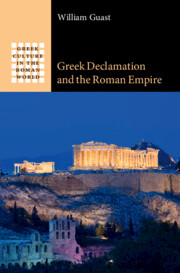Book contents
- Greek Declamation and the Roman Empire
- Greek Culture in the Roman World
- Greek Declamation and the Roman Empire
- Copyright page
- Dedication
- Contents
- Preface
- Abbreviations
- Introduction
- Chapter 1 Exempla and Exemplarity
- Chapter 2 Declamation, Life, and the Imagination
- Chapter 3 Text and Performance Context
- Chapter 4 Identity Parade
- Chapter 5 Macedon
- Chapter 6 Strife and Concord
- Conclusion
- Book part
- References
- Index
Chapter 5 - Macedon
Published online by Cambridge University Press: 22 June 2023
- Greek Declamation and the Roman Empire
- Greek Culture in the Roman World
- Greek Declamation and the Roman Empire
- Copyright page
- Dedication
- Contents
- Preface
- Abbreviations
- Introduction
- Chapter 1 Exempla and Exemplarity
- Chapter 2 Declamation, Life, and the Imagination
- Chapter 3 Text and Performance Context
- Chapter 4 Identity Parade
- Chapter 5 Macedon
- Chapter 6 Strife and Concord
- Conclusion
- Book part
- References
- Index
Summary
This chapter looks at the broader contemporary significance of declamation, focusing on (Macedonian) imperialism, and taking as its major case study Aristides' To the Thebans: concerning the alliance I–II (Orr. 9–10), in which Aristides recreates Demosthenes' speech urging alliance between Thebes and Athens before Chaeronea. The image of an attack by a despotic and barbaric king echoed some presentations of the Parthian menace, potentially ennobling a contemporary conflict. But the image of the greedy despot also echoed discourses about 'bad' emperors, thereby offering a negative exemplum to heed. Finally, Macedon in these texts further recalls the Roman empire more generally: accordingly, these texts make available an unusually negative attitude to the empire, but also, I argue, a celebration and a justification of Rome's power over Greece. I compare the discourses present in a fragment of Pollux's declamation On the Islanders, where the Persian court recalls Lucian's denunciation of the vulgarity of rich Romans in his De mercede conductis. In closing, I note the particularly high number of potentially meta-exemplary remarks in Aristides' declamations, encouraging audiences to ponder these texts' meaning deeply.
- Type
- Chapter
- Information
- Greek Declamation and the Roman Empire , pp. 119 - 150Publisher: Cambridge University PressPrint publication year: 2023



